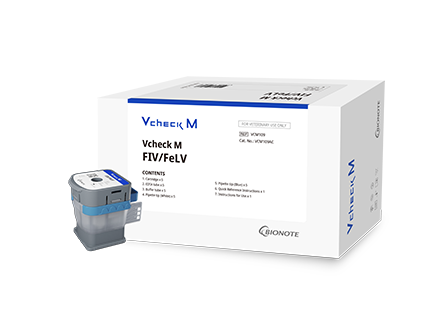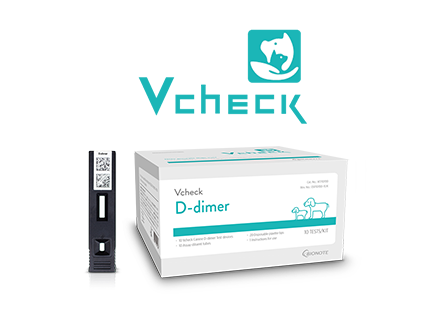
- BIONOTE
- Support
- News
-
 BIONOTE launches a new cartridge for the diagnosis of two feline retroviruses.
BIONOTE launches a new cartridge for the diagnosis of two feline retroviruses.▶Planning to maximize the market share in on-site POC molecular diagnostics by expanding the product portfolio.BIONOTE announced on the 5th of March that they have launched ‘Vcheck M FIV/FeLV’ which is for diagnosing Feline Immunodeficiency Virus (FIV) / Feline Leukemia Virus (FeLV). M10 is an automatic analyzer that can perform both nucleic acid extraction and PCR, which previously needed to be performed separately using two different machines. The test procedure is simple enough for any veterinarian to perform on-site at the animal hospitals without separate prior training. Furthermore, depending on the user's needs, they can customize how many modules they would like to use, up to a maximum of 8, making the M10 suitable for small hospitals, large hospitals, and even labs. A BIONOTE Spokesperson commented, “Following the launch of Feline Immunodeficiency Virus (FIV) and Feline Leukemia Virus (FeLV) cartridge, we will now be actively expanding the export internationally starting this month.” And that “We will accelerate the sales activity with 'Canine Vector 8 panel' and 'Canine Anemia 8 panel’ and strengthen our portfolio with the POC molecular diagnostic products, including 'Diarrhea 8 panel', which will be released this year. Our goal is to maximize our global market share in the veterinary field of molecular diagnostics as well”. Meanwhile, BIONOTE also aims to domestically launch a diagnostic cartridge with Babesia gibsoni which is known as causing a fatal tick-borne disease in dogs. BIONOTE is currently developing various test panels such as respiratory, anemia-causing pathogens and panels for livestock animals.
- 2024.03.05
- Hits : 9,959
-
 BIONOTE Accelerates Expansion into North American Market Through VMX Conference
BIONOTE Accelerates Expansion into North American Market Through VMX Conference▶ BIONOTE promoted its products and provided lectures by prominent veterinarians about their experiences of applying Vcheck F to clinical settings ▶ Strengthen veterinary network across all areas of the U.S. to expand market share Global leader in Veterinary Diagnostics and Biological Raw Materials BIONOTE Inc. announced on the 19th of January that its US Branch, BIONOTE USA, participated in VMX (Veterinary Meeting & EXPO), one of the largest veterinary conferences in the world held in Orlando, Florida between the 13th and 17th of January (local time). The VMX Conference is held in Orlando, Florida every year with over 15,000 members of the veterinary industry such as veterinarians, veterinary students, and veterinary technicians attending for various exchanges. Further, prominent speakers give lectures and companies unveil new products and technologies for animal clinics at the event.*Veterinary technicians: helps veterinarians in diagnosing patients effectively and performs surgery preparations, surgical assistance, and postoperative recovery observations. BIONOTE focused on promoting their point of care fluorescent immunoassay analyzer 'Vcheck F V200', which is the number 1 product globally in terms of market share, along with cardiac disease-related biomarker test reagents such as 'NT-proBNP', 'TnI' and hormone biomarker test reagents such as 'Cortisol'. BIONOTE's booth also featured lectures by prominent veterinarians (Dr. Elizabeth Rozanski, Tufts Cummings School of Veterinary Medicine / Dr. Luis Tarrido, Eden Veterinary Clinic / Dr. Geri Lake-Bakaar, Evolution Veterinary Specialists) on the subject of their experience of applying Vcheck F products in clinical settings and their experience of evaluating the products. A BIONOTE spokesperson stated "To increase awareness and market share in the U.S., we are actively participating in conferences to meet and promote to veterinarians in person, with the support of KOTRA's global support project for mid-sized companies" and that "We will continue to participate in various academic conferences and exhibitions across the United States to increase brand awareness". Meanwhile, BIONOTE successfully launched three types of Equine-related biomarker products (Foal IgG, Progesterone, SAA) last year to target the U.S. market, and plans to lead the Equine diagnostic reagent market by developing additional Equine products this year.
- 2024.01.19
- Hits : 9,381
-
 BIONOTE's Vcheck D-dimer, a More Sensitive Biomarker for Blood Clot Screening
BIONOTE's Vcheck D-dimer, a More Sensitive Biomarker for Blood Clot Screening▶ D-dimer diagnostic kit for quantitative results in-house The sensitivity of BIONOTE's D-dimer kit, which can be used with the immunoassay analyzer Vcheck (V200 and V2400), has increased even more. During the secondary hemostasis of the blood clotting process, fibrin clots are produced, and they are degraded by plasmids into fibrin degradation products (FDP). D-dimer is one of the final degradation products of these processes and is considered a highly sensitive biomarker for coagulation activity.The biomarker can be used to detect excessive thrombus formation early, which can aid in screening for diseases related to thrombus, such as thromboembolism (TE) or disseminated intravascular coagulation (DIC).D-dimer can be clinically utilized by testing patients with risk factors that may cause thromboembolism such as cancer, sepsis, pancreatitis, vascular disease, or immune-mediated diseases. Furthermore, it can also be utilized for preemptively preventing emergencies after surgery or to monitor the progress and effectiveness of antithrombotic therapy. A high correlation (R²=0.9289) was confirmed for the Vcheck measurements, in comparison with third-party analyzers with proven validity in canine D-dimer measurements, proving the Vcheck result's validity. A BIONOTE spokesperson stated, "The ability to screen for thrombus was improved by upgrading the performance (sensitivity) of the Vcheck D-dimer kit, which was first launched 5 years ago".The Vcheck analyzer can measure a total of 30 biomarkers including inflammation markers (CRP, SAA), pancreatitis markers (cPL, fPL), cardiac disease markers (NT-proBNP, Troponin I), kidney disease markers (SDMA), hormones (T4, TSH, Cortisol), antibody titer tests, as well as D-dimer.
- 2024.01.16
- Hits : 9,351